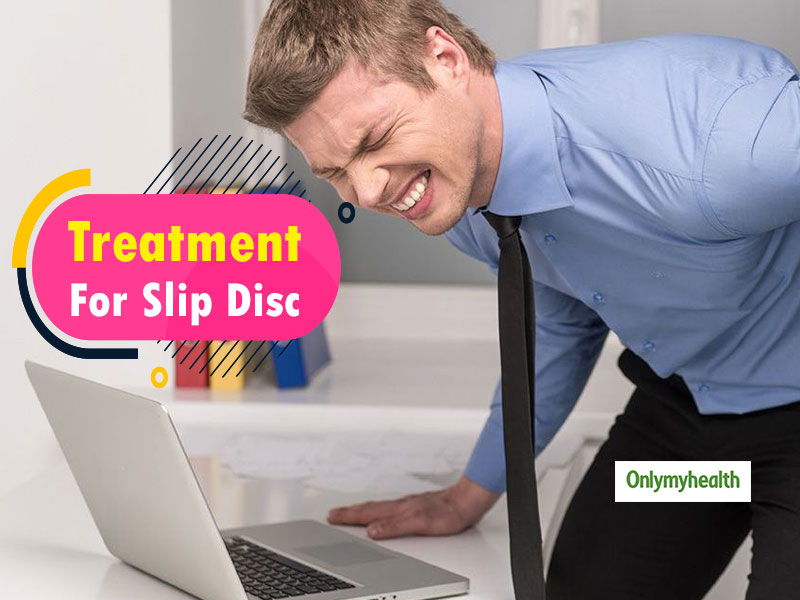
If you have a pain in your back, neck and other sensitive areas, what do you do? Normally, you just apply an ointment or head for a good massage. But they are temporary treatments. What if the pain continues and the problem grows more serious? Watch out, you may have slipped disc.
A slipped disc is a very painful medical condition that is the result of an injury. In this condition, the vertebra that is the cushion between the bones in the spine is injured and moved from its position. This displacement presses the vertebra against the nerve leading to its inflammation. At times the pain is so severe that it extends to the leg.
"Disc is a soft material between two spine bones which acts as a protective pad. These discs do not actually slip, but may split or rupture, causing a gel like substance to escape into surrounding areas. This gel puts pressure on the spinal cord and the nerves, causing pain around the damaged disc. This condition is known as herniated, ruptured, prolapsed disc or more commonly a slipped disc," says Dr. Manoj Kumar, consultant, Moolchand Orthopaedics Hospital. A slipped disc in the lower back is most often seen between the ages of 30 and 50. In the cervical vertebrae around the neck, slipped discs are most often seen between the ages of 40 and 60. The most frequently affected area is the lower back, but any disk can rupture, including those in the neck.
Causes
The most common cause of slipped disc is improper bending. Also, any accident which might have inflicted pressure on the spinal chord could be a probable cause of slipped disc. Apart from these, improper lifting, frequent and improper turning and twisting of the back put high pressure on spine, causing slipped disc.
Symptoms
- Pain in back, neck and lower part of the body.
- Partial or complete numbness in parts above and below the affected area. This slowly leads to a paralytic condition.
- Scratchy/itchy (tingling) feeling around genitals.
- Weakening of muscles

Risk grows more with these factors
Lifestyle choices such as tobacco use, lack of regular exercise and inadequate nutrition substantially contribute to poor disc health.
As the body ages, natural biochemical changes cause discs to gradually dry out affecting disc strength and resiliency.
Poor posture combined with the habitual use of incorrect body mechanics, hard physical labor (delivery) can place additional stress on the spine.
Combine these factors with the effects from daily wear and tear, injury, incorrect lifting, or twisting and it is easy to understand why a disc may slip.
Also Read: Most Common Spine Problems and their Causes
Don't face it, prevent it!!
- Regular exercise can decrease the hardening and natural breakdown of discs in the back that comes with the aging process. It can also help keep the supporting back muscles strong and supple.
- Always use correct techniques for lifting.
- Warm-up and cool down with stretching exercises before any workout or sports activity.
- Have a comfortable, supportive seat when sitting or driving for a long period and take breaks to stretch and walk around if possible.
- Walk or stand with the head and shoulders slightly back. When sitting at a desk, make sure that the chair is the right height for the desk.
- Sleep on a bed with a mattress that matches and supports your spine's natural curves.

"Contradictory to common belief, slipped disc isn't life threatening and neither does it cause paralysis. Also, it is very much curable," says Dr Manoj.
Also Read: Why do you have a Back Ache? Digital Spine Analysis has the Answers
Surgery Mild slipped disc can be treated by avoiding improper methods of lifting heavy objects. Physiotherapy can be useful in healing slipped disc. In extreme cases one might have to undergo surgery. The aim of surgery is to cut out the prolapsed part of the disc. This often eases symptoms. However, it does not work in every case. A specialist will advise on the pros and cons of surgery. So don't take lightly the effects of back pain and make the problem worse. Just head to check out if you have slipped disc and take immediate steps.
Read More on Other Diseases
How we keep this article up to date:
We work with experts and keep a close eye on the latest in health and wellness. Whenever there is a new research or helpful information, we update our articles with accurate and useful advice.
Current Version